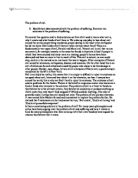Outline the key features of The Problem of Evil and two solutions
Philosophy
Outline the key features of The Problem of Evil and two solutions
Introduction
The Problem of Evil has been a difficult subject for theists over a long period of time. The two atheists Hume and Dawkins suggest that evil is the major flaw in religion. As according to 18th century atheist David Hume, the problem of evil is “the rock of atheism”, while Dawkins disputes that religion is the “root to all evil”. The Problem of Evil presents a God that contrasts with theist’s classical definition, that he is omnipotent, omniscient and omnibenevolent. However, if a God with these specific characteristics existed, he would be able to get rid of evil, for an all knowing God and all powerful God would have the strength and knowledge to get rid of it. This is described J.L. Mackie’s inconsistent triad, as Mackie suggests that the three characteristics of God’s classical theism cannot be present while evil exists.
The Problem of Evil is an emotive topic and this can influence our response. Historical tragedies, such as the Holocaust, make theists question their religion, as the intensity of suffering is often too strong to cope with.
The Augustinian Theodicy offers a solution to The Problem of Evil. Plato influenced St Augustine of Hippo. He argued that evil was not a separate force over and above goodness. Instead he described evil as a privation of good that God did not create. Rather, God gave humankind free will, which allowed people the choice to choose evil. Another part of the theodicy is that natural evil is the loss of order in nature caused by sin. This sin derived from the downfall of Adam and Eve in the Garden of Eden, and so subsequent humanity are descended from them and share their sin. However, what tempted Adam and Eve was original sin committed from angels that were tempted by Satan to fall. Therefore, according to Augustine, sin is the punishment allowed by God as justice, as a result of evil. Though while natural suffering is either sin or a punishment for sin, Augustine stated that humankind could be saved from sin through Jesus’ death. “Free will is the cause of our doing evil…thy just judgment is the cause of our having to suffer the consequences.”








